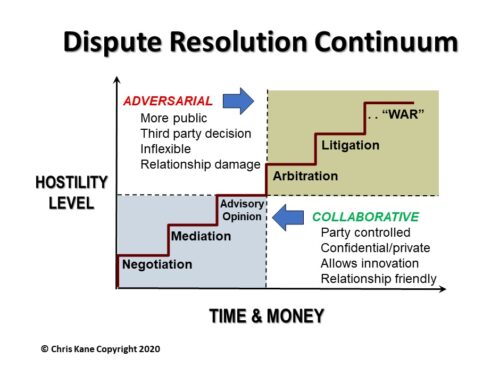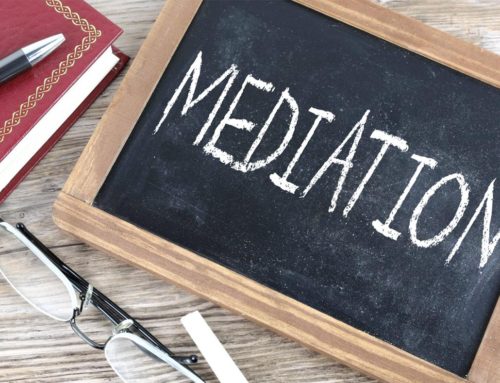In one way or another, nearly everyone in our country has been hurt at least financially and emotionally, if not physically, by the impacts of COVID 19. CCCs have resulted from: Landlords have not been paid lease payments; tenants have not had the income to pay rent; businesses have been forced to operate under new restrictions and many have gone under; families have been stressed either when forced to separate, or in other cases forced to spend too much time together; restaurants have been closed for months and now forced to move outside.
Efforts to resolve these conflicts are beginning to materialize as business and communities begin opening up. The menu of dispute resolution options needs to be carefully considered. Direct negotiations of disputes can be the quickest and least cost method of conflict resolution. Certainly, if the parties can negotiate the resolution of such conflicts on their own, with outside assistance, more power to them. But what happens when the disputants can’t figure out how to resolve their problems and are forced to go to a third party.
Adjudication of their differences in courts and binding arbitration may only make matters worse. These two methods take time and cost money when the disputants choose to go this route. Legal issues like “force majeure” clauses in some contracts are anything but clear. They are interpreted broadly in some states, narrowly in others and in any case have rarely been applied to this situation. Furthermore, the disputants in adjudicative adversarial methods, have totally given up control and any possibility of producing creative mutually agreeable solutions. They are in for a pure win-lose proposition and often a lose-lose situation at that.
Mediation is by far the preferred method for conflict resolution under these circumstances, for resolving CCC’s. The time to begin mediating is as soon as possible. It is important to quickly find creative, common sense solutions recognizing we are all in this together. Many areas of the country are taking the lead in establishing mediation initiatives for these CCCs, and are well worth noting as models. A couple of programs were identified recently by some of the law students in my Mediation Class at William & Mary Law School and are illustrative.
- Landlord/Tenant Mediation Program, Indiana – From the start of the coronavirus pandemic and resulting shut downs, many people have been losing their jobs. As a result, millions of people quickly became unable to pay their rents. As in many states Indiana’s Governor issued Executive Orders that prevented landlords from evicting tenants for inability to pay rent. Many of those moratoriums have already or are about to expire. Unfortunately, people who lost jobs despite some of them returning to work, still are feeling the severe financial impact from the pandemic.
Recognizing these continuing financial problems, the Delaware County Board of Judges established a landlord/tenant mediation program intended to help reduce evictions. In addition the program can also assist in allowing some to leave their rental properties. Part of the mediation needs to include provisions regarding the issue of repaying back rent. The program is free and so is a certified mediator for the landlord or tenant, regardless of income. Participation is voluntary. Grant money from a local foundation pays for the mediators’ services.
- MEND (Mediating Establishment and Neighbor Disputes), New York City. When the NYC began to reopen, changes were required in the way businesses operated. Many small businesses began operating under new guidelines to expand outdoor in order to protect health. As a result, residents and neighboring establishments began to get into more conflicts over quality-of-life issues and the increased noise. The old remedy of simply calling in complaints to the NYC government and issuing summonses and fines did nothing but add financial hardship to small businesses already struggling.
Thus, the Mayor came up with the MEND Program which provides for mediation between residents and establishments to seek negotiated solutions. The program is free, and much more positive and community building in these hard times, compared with a simple penal system of fines. Mediation has brought more enduring solutions to these local issues that have been exacerbated by the COVID-19 crisis. It is estimated MEND will serve hundreds of NYC residents and businesses each year, creating opportunities to resolve disputes and avoiding escalation to formal enforcement.
As demonstrated in these two examples, mediation is very well suited for CCCs. Mediation is a private, informal, confidential, and non-binding method of dispute resolution. The mediator’s main role is to actively assist the parties in achieving their interests and fostering settlements that are sustainable. The mediator serves to schedule and “coach” negotiations and act as a catalyst to get the parties past their emotions and into problem solving mode.
By using mediation, the parties remain in complete control of the resolution of their dispute. He or she can help develop proposals, and serve as an assessor – not a judge – of the positions taken, and encourage a party-determined resolution. With the help of a neutral, parties can often fashion a settlement that satisfies their individual interests, and provides for potential creative “win-win” and innovative outcomes.
In addition, mediation saves a great deal of time and expense, often resolving matters in less than 10% of the time and expense of an adjudicated process. In this time of limited resources and weekly challenges, no one needs the distraction of litigation or arbitration. Furthermore, we are all in this challenging situation together, and hopefully can approach conflict resolution in a much more cooperative way.
Perhaps among the “silver linings” that come from this pandemic, our society will embrace the curative powers of collaboration and mediation. If a result of what we went through helps us begin to rely less on adversarial processes of complaints, litigation and arbitration, we will certainly be on the way to a cure to what ails us.
Further Reading: American Bar Association — “Is the Coronavirus a Force Majeure that Excuses Performance of a Contract?”





